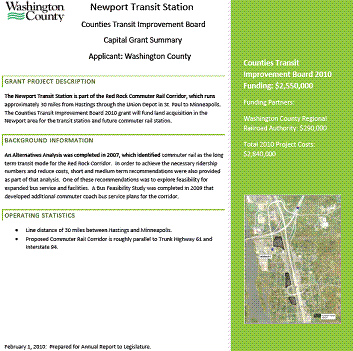|
[ VoteJimMartin.com ] |
This Is An Archive Of The 2010 Campaign[ Home ] [ About ] [ Issues ][ Promotional Material ] [ Contribute ] [ Events ] [ Reference ] [ Contact ] |
Issues, Taxation Coercion
Minnesota Statute § 297A.992 allows eligible counties to join a "joint powers board." The participating counties send representatives to sit on the board, which can establish a technical advisory group. To raise funds, each participating county must collect a transit improvement tax and the board may issue bonds. As for spending the revenues, the board must form a committee to issue grants for specific transit improvement projects. The board must file a report to the legislature every February. So far, it sounds like counties have a voluntary involvement in the maintenance and expansion of the public transit system in their own county.
 But, that's not the whole story. The chair of the Metropolitan Council, an unelected body, has voting rights on the board. Furthermore, the advisement group must consist of the Metropolitan Council and the grant committee must seat the chair of the Metropolitan Council's Transportation Committee. When the grant committee receives a proposal, the Metropolitan Council must review and approve the proposal before the grant can be funded. As stated in the 2010 CTIB Annual Legislative Report, over 86% of the $93,860,178 of grants payable in 2010 were given to the Metropolitan Council! If that was not enough, the board is required to give the Metropolitan Council an extra $30,783,000 of the tax revenue. And, there's more.
But, that's not the whole story. The chair of the Metropolitan Council, an unelected body, has voting rights on the board. Furthermore, the advisement group must consist of the Metropolitan Council and the grant committee must seat the chair of the Metropolitan Council's Transportation Committee. When the grant committee receives a proposal, the Metropolitan Council must review and approve the proposal before the grant can be funded. As stated in the 2010 CTIB Annual Legislative Report, over 86% of the $93,860,178 of grants payable in 2010 were given to the Metropolitan Council! If that was not enough, the board is required to give the Metropolitan Council an extra $30,783,000 of the tax revenue. And, there's more.
As prescribed by Minnesota Statute § 473.145, the Metropolitan Council adopted a comprehensive guide prescribing the development of land use for transit facilities in the metropolitan area. The Minnesota Supreme Court has ruled that, citing statute, "If the Council finds that a local government's comprehensive plan 'may have a substantial impact on or contain a substantial departure from metropolitan system plans,' it can, by resolution, require the local government to modify its comprehensive plan." (See City Of Lake Elmo v. Metropolitan Council, 685 N.W.2d 1 (Minn. 2004)). As found on page 131 of the Metropolitan Council's 2030 Transportation Policy Plan, Chapter 7: Transit, the counties eligible to be on the board required to levy the transit tax must build the Metropolitan Council's transit vision. That means, in part, that they absorb the cost. As every grant of the board is being used to manifest these required projects, the counties joining the board are forced to absorb less. Thus, counties are coerced by the Metropolitan Council to levy the transit tax. And, the only two eligible counties that are not levying the transit tax are those in which the Metropolitan Council has no expansion projects: Carver and Scott (see 2030 Transportation Policy Plan Summary, page 4 and 7). The coercion of Washington County, and ultimately district 56A, is clearly evident.
Tell us what you think about being coerced to levy a tax.
Public Comment AgreementWe welcome your comments regarding this issue. In making a submission via the form at the right, you agree that we may censor and/or remove your comments at our sole discretion for (but not limited to) language, mud slinging, unrelated context, and poor behavior. You further agree not to reproduce the content of this website. We reserve the right to regulate and terminate the ability of this feature. Your use, viewing, access, or combination thereof of this website constitutes acceptance of these terms and any future modifications made hereto. Comments are limited to 500 characters, and all other fields are limited to 30 characters. Your comment will be posted at the bottom of this page in the order it is received. |
Fatal error: Uncaught Error: Call to undefined function mysql_pconnect() in /home/northmop/2010.votejimmartin.com/classes/General.php:15 Stack trace: #0 /home/northmop/2010.votejimmartin.com/classes/General.php(236): General::GET_LINK() #1 /home/northmop/2010.votejimmartin.com/issues/taxation_coercion.php(19): General::PRINT_COMMENTS(2) #2 {main} thrown in /home/northmop/2010.votejimmartin.com/classes/General.php on line 15